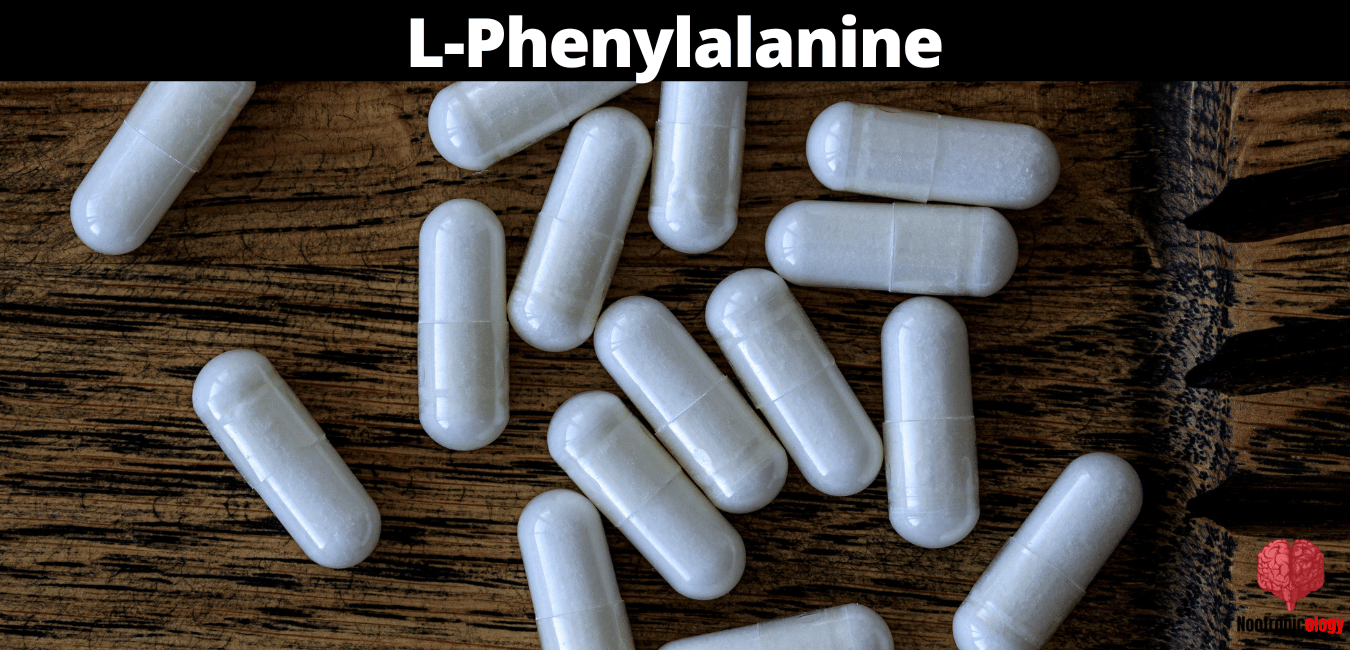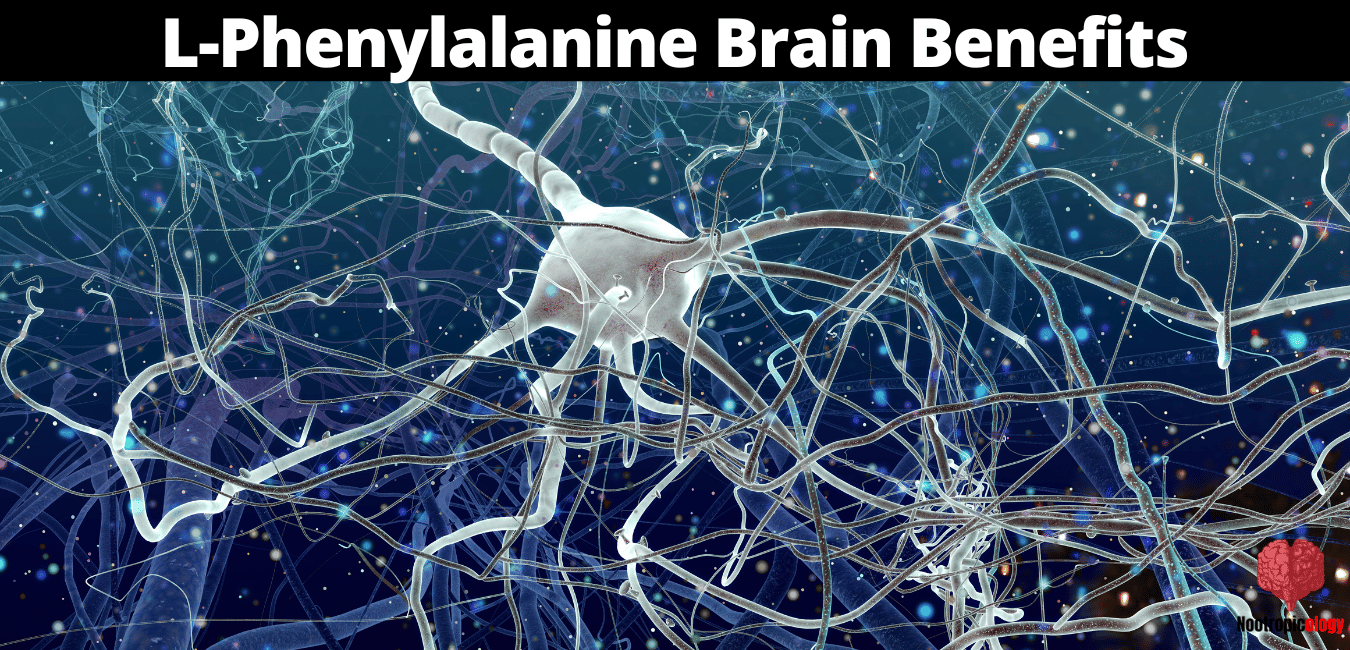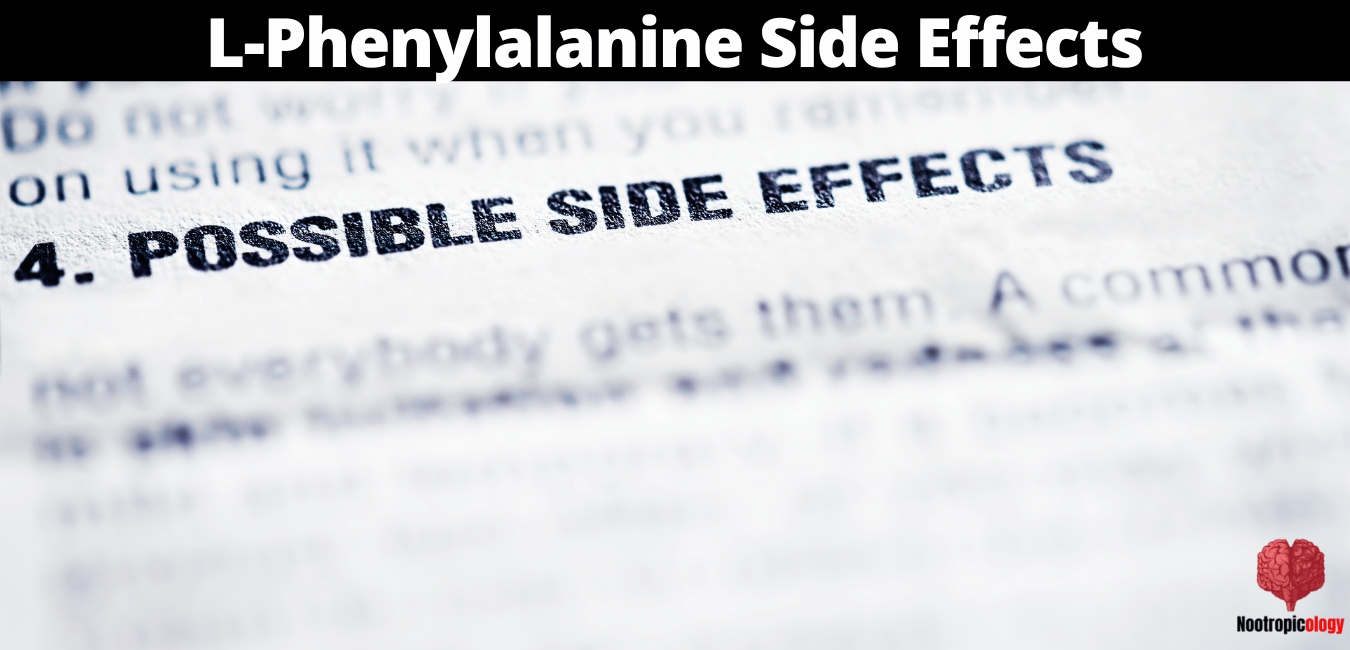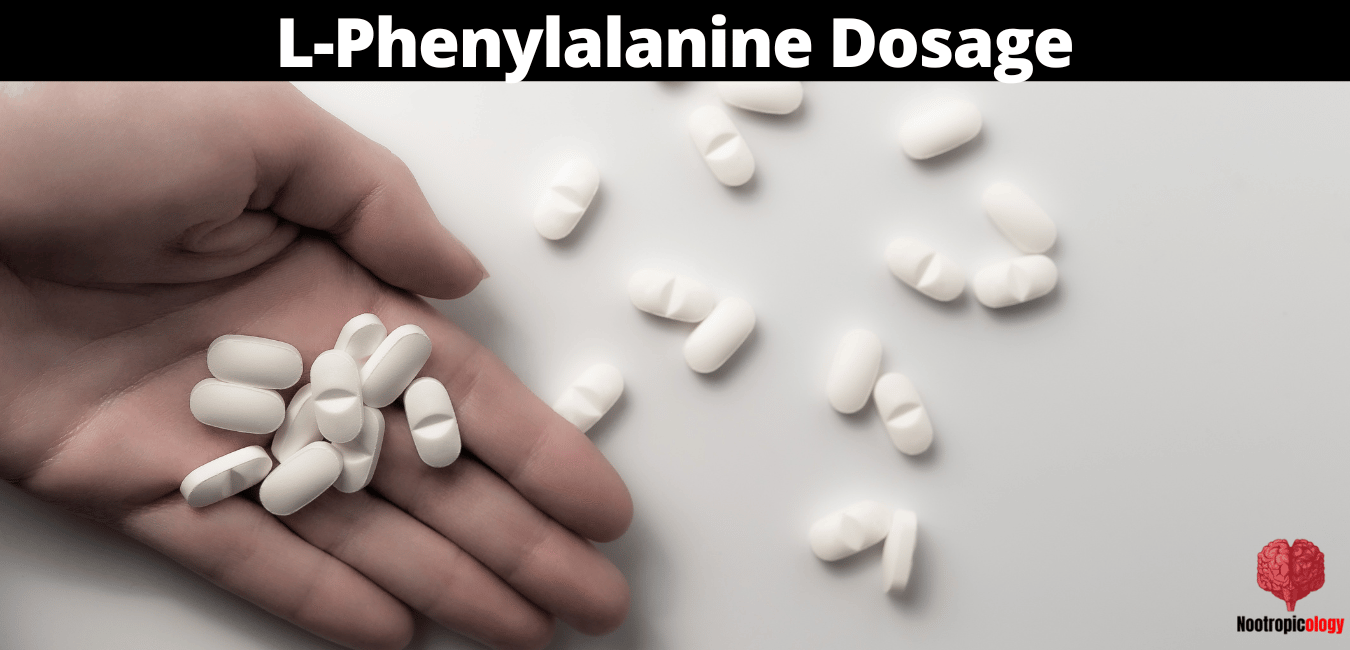L-Phenylalanine Nootropic Review: Benefits, Side Effects & Dosage
The world of nootropics, colloquially known as "smart drugs" or "cognitive enhancers," has seen a significant surge in popularity over the past few decades.
These compounds, ranging from herbal supplements to synthesized molecules, claim to boost cognitive functions, enhance memory, and invigorate the mind. Within this vast spectrum lies a unique category: amino acids.
Unlike typically synthesized compounds like your Modafinil, amino acids are the building blocks of proteins, playing pivotal roles in various physiological processes, including brain function.
L-Phenylalanine caught my attention during my deep dive into the nootropic world. As an essential amino acid, it plays a role not only in protein synthesis but also as a precursor for vital neurotransmitters. Intrigued by its potential cognitive benefits, I embarked on a journey of exploration, both through scientific literature and personal experimentation.
However, as with any substance, it's crucial to approach it with a healthy dose of skepticism and an emphasis on evidence-based findings. Anecdotal reports and personal experiences can offer insights, but it's the rigorous scientific studies and peer-reviewed articles that provide the most reliable information.
Throughout this review, while I will share my own experiences with L-Phenylalanine, I will always prioritize data and research-backed evidence to present a comprehensive understanding of this intriguing amino acid. So without further ado, let's dive in!
Background on L-Phenylalanine - How Does It Work in the Brain?


Delving into the molecular intricacies of nootropics often leads us to understand not just the substance itself, but the myriad physiological pathways it influences. This section aims to provide readers with a foundational understanding of L-Phenylalanine, from its basic classification to its role in neurotransmitter synthesis.
This foundational knowledge is essential to grasp the potential cognitive effects of this amino acid and how it interacts within our complex neurochemical systems.
Scientific Classification and Origin
L-Phenylalanine is classified as an essential amino acid. The term "essential" in biochemistry denotes that the body cannot synthesize this compound endogenously in adequate amounts, necessitating its intake through diet. Found abundantly in foods like meat, fish, eggs, dairy, and certain beans, L-Phenylalanine is a vital component for various biological processes.
Definition as an Essential Amino Acid
As one of the nine essential amino acids, L-Phenylalanine plays a pivotal role in protein synthesis. Proteins, being the workhorses of the cell, are integral for a plethora of cellular functions, including those within the brain. The correct structure and function of proteins largely depend on the presence and sequence of specific amino acids, underscoring the importance of L-Phenylalanine in physiological processes.[1]
Metabolic Pathway and Neurotransmitter Synthesis
Interestingly, the role of L-Phenylalanine doesn't stop at protein synthesis. This amino acid is also a critical precursor to another amino acid, tyrosine. Once in the body, L-Phenylalanine gets converted to tyrosine, a process facilitated by the enzyme phenylalanine hydroxylase.[2]
Tyrosine's importance in neurochemistry cannot be overstated. It serves as the precursor for a range of neurotransmitters vital for cognitive functions and mood regulation.[3] Specifically, tyrosine is integral for the synthesis of dopamine, a neurotransmitter linked with pleasure, reward, and motivation. Furthermore, tyrosine is involved in the synthesis of epinephrine and norepinephrine, neurotransmitters that play roles in attention, alertness, and the body's response to stress.
Understanding the metabolic pathway of L-Phenylalanine and its involvement in neurotransmitter synthesis offers valuable insights into its potential cognitive and mood-enhancing benefits.
Relevance of L-Phenylalanine as a Nootropic
The role of L-Phenylalanine in neurotransmitter synthesis, especially those neurotransmitters central to cognitive function and mood, makes it particularly relevant in the realm of nootropics. Nootropics, by definition, are substances that can enhance cognitive functions like memory, creativity, motivation, and attention.[4] Given that dopamine, synthesized from L-Phenylalanine via tyrosine, is crucially associated with motivation, reward, and learning, its modulation is of keen interest to those seeking cognitive enhancement.
Furthermore, the synthesis of norepinephrine and epinephrine, which are pivotal for attention and alertness, emphasizes the possible impact of L-Phenylalanine on focus and cognitive agility. This link between an essential amino acid's metabolic pathways and the brain's neurochemical landscape highlights the potential of L-Phenylalanine as a nootropic agent. By influencing the production of these critical neurotransmitters, L-Phenylalanine offers avenues for optimizing cognitive performance, mood regulation, and overall brain health.
Moreover, in the nootropic community, there's a perpetual quest for substances that can provide an edge, improve mental clarity, or boost mood naturally. Given L-Phenylalanine's role in essential physiological processes and neurotransmitter synthesis, it's not only a subject of scientific intrigue but also holds promise for those looking to enhance their cognitive potential through natural avenues.
L-Phenylalanine Therapeutic & Nootropic Applications and Benefits


Building on the foundational understanding of L-Phenylalanine's role in neurotransmitter synthesis, it's imperative to delve into its broader therapeutic applications. This amino acid isn't just a building block for proteins; its influence on crucial neurotransmitter pathways offers a range of potential health benefits, especially in the domains of mood regulation, pain management, and cognitive function.
Mood Enhancement
Central to the discussion of mood is the dopamine pathway. As a precursor to dopamine, L-Phenylalanine has been researched for its potential in mood enhancement. Dopamine is notoriously known as the "feel good" neurotransmitter. It's responsible for feelings of pleasure, reward, and motivation.
Any imbalance in its levels can lead to mood disorders, including depression. Clinical studies have ventured into examining L-Phenylalanine's potential in alleviating symptoms of mood disorders. Its role in elevating dopamine levels can be particularly beneficial for individuals with specific types of depression linked to dopamine deficiency.[5]
Pain Management
Beyond mood, L-Phenylalanine plays an intriguing role in the body's natural pain management system. It is believed to influence the endorphin system, our body's natural "painkillers." Endorphins, produced in response to stress or discomfort, act as analgesics (pain reducers) and provide a natural high, akin to morphine.
Research has examined DL-phenylalanine's (DLPA) potential in enhancing endorphin release, making it a candidate for addressing chronic pain conditions. Some studies suggest that it might benefit individuals with specific pain disorders, although more extensive research is required.[6]
Cognitive Enhancement
Finally, the amino acid's role in the production of catecholamines, including dopamine, norepinephrine, and epinephrine, situates it within the sphere of cognitive enhancers. These neurotransmitters are pivotal for attention, learning, and memory. An optimal level of catecholamines, particularly in the prefrontal cortex, can enhance alertness, focus, and cognitive agility.[7]
By supporting the production of these neurotransmitters, L-Phenylalanine offers avenues for improving attention span, learning capacity, and overall cognitive performance. This makes it a compound of interest for students, professionals, and anyone looking to optimize their mental clarity and productivity.
L-Phenylalanine Side Effects and Safety Concerns


L-Phenylalanine, while offering several cognitive and therapeutic benefits, is not without its potential drawbacks. A responsible approach to any nootropic necessitates a clear understanding of its safety profile. This includes knowledge of commonly reported side effects, drug interactions, and the variability inherent in individual experiences.
Common L-Phenylalanine Side Effects
The general safety of L-Phenylalanine has been established in numerous studies.[8] However, as with many supplements, certain side effects have been reported. Some users have experienced digestive discomforts like nausea and heartburn.
Headaches, another frequently mentioned side effect, might be attributed to alterations in neurotransmitter levels, particularly when initial dosages are high or if there's an abrupt change in consumption. It's important to note that while these side effects are commonly associated with L-Phenylalanine supplementation, they might not be pervasive and could be influenced by dosage and individual physiology.
L-Phenylalanine's Interaction with Other Medications
L-Phenylalanine's role in neurotransmitter synthesis naturally raises concerns about its interaction with medications that modulate the central nervous system (CNS). For instance, since this amino acid can influence dopamine levels, there's a potential for interaction with drugs that act on dopaminergic pathways. This becomes particularly significant when considering drugs like certain antipsychotics or medications for Parkinson's disease.
Additionally, considering its potential mood-enhancing properties, caution is warranted when pairing L-Phenylalanine with antidepressants. This combination could, in theory, amplify the effects of both the drug and the supplement, leading to a condition known as "serotonin syndrome." While this scenario is more theoretical than proven, it underscores the importance of thorough research and consultation with healthcare professionals before co-administering supplements and medications.
Personal Experiences and Observations
While scientific literature provides a comprehensive overview of L-Phenylalanine's safety profile, personal anecdotes further enrich this tapestry of understanding. Anecdotal reports suggest a wide range of experiences, from profound cognitive enhancement without side effects to instances of digestive discomfort or headaches.
This variability underscores the fact that nootropics, like all substances, don't offer a one-size-fits-all experience. Dosage adjustments, gradual introduction, and keen observation of one's body and mind are essential when experimenting with L-Phenylalanine as a cognitive enhancer.
L-Phenylalanine Dosage, Cycle, and Recommendations


Navigating the realm of nootropics involves a combination of scientific evidence, expert recommendations, and personal trial and error. With L-Phenylalanine, finding the right dosage, understanding cycling strategies, and evaluating potential stacking options are critical to maximizing benefits while minimizing potential side effects.
Optimal L-Phenylalanine Dosage
When it comes to dosing L-Phenylalanine, the medical literature offers some guidelines. Typically, doses range from 500 mg to 2,000 mg daily for therapeutic applications. However, when focusing on its nootropic properties, a starting dose of 500 mg to 1,000 mg is commonly recommended.
It's always prudent to start on the lower end to gauge individual reactions. In my personal exploration, I began with 500 mg and gradually increased it, monitoring the cognitive effects and any potential side effects.
L-Phenylalanine Cycling Considerations
Cycling, or periodically refraining from taking a supplement, can be a strategic approach for long-term nootropic users. The rationale behind this is to prevent potential tolerance development, ensuring that the nootropic remains effective. With L-Phenylalanine, while there isn't a vast body of evidence suggesting rapid tolerance development, periodic breaks can be beneficial.
For instance, a cycle of 3 months on followed by 2-3 months off is a good place to start.
Stacking L-Phenylalanine with Other Nootropics
L-Phenylalanine, given its role in neurotransmitter synthesis, can offer synergistic benefits when combined with other nootropics. A popular stack involves combining it with racetams, like piracetam or aniracetam, which may amplify cognitive benefits due to enhanced neurotransmitter activity. However, caution is necessary. Combining L-Phenylalanine with other substances that modulate neurotransmitter levels, like 5-HTP, might lead to overstimulation or imbalance.
It's essential to remember that stacking while promising, necessitates thorough research. One should be wary of combining multiple substances without understanding their individual and collective effects. Consulting literature, expert opinions, and ideally, a healthcare professional, can be invaluable when considering various nootropic stacks.
Overall, the world of nootropics is a vast and evolving field. L-Phenylalanine, with its established roles in neurotransmitter synthesis and promising nootropic properties, offers a lot of potential. However, as with all supplements, a responsible, informed, and individualized approach is the key to success.
Frequently Asked Questions (FAQ)
What is the primary role of L-Phenylalanine in neurotransmitter synthesis?
L-Phenylalanine serves as a precursor to tyrosine, which subsequently aids in the synthesis of neurotransmitters like dopamine, epinephrine, and norepinephrine.
How does L-Phenylalanine influence mood and cognitive function?
L-Phenylalanine is a precursor to tyrosine, which plays a pivotal role in the production of dopamine, a neurotransmitter essential for mood regulation and cognitive alertness.
Can L-Phenylalanine supplementation boost focus and concentration?
Yes, by increasing catecholamine production, L-Phenylalanine may enhance alertness, focus, and overall cognitive function.
How does L-Phenylalanine compare to other nootropics in enhancing brain function?
Unlike synthetic nootropics, L-Phenylalanine is a natural amino acid that indirectly supports brain function by aiding neurotransmitter synthesis. Its effects might be subtler compared to direct cognitive enhancers.
What is the difference between L-Phenylalanine, DL-Phenylalanine, and Phenylalanine?
L-Phenylalanine is the natural form found in proteins, involved in neurotransmitter synthesis. DL-Phenylalanine combines the L- and synthetic D-forms, aiming to provide the benefits of both, with potential analgesic and antidepressant properties. Phenylalanine is a general term that typically refers to the L-form but may include both forms depending on context.
What is the half-life of L-Phenylalanine in the human body?
L-Phenylalanine is absorbed and metabolized relatively quickly in the human body. While specific half-life data can vary, it is generally reported to be around 2 to 3 hours. This means that approximately half of the L-Phenylalanine ingested would be eliminated or metabolized within this time frame. It's essential to note that individual factors, such as metabolism, kidney function, and overall health, can influence this rate.
My Final Thoughts on L-Phenylalanine
Navigating the vast landscape of nootropics can often be a daunting task, given the plethora of compounds each boasting their own array of benefits. L-Phenylalanine, with its intriguing amino acid profile, has piqued the interest of many, including myself, in the quest for cognitive enhancement and well-being.
Summary of Benefits and Risks
L-Phenylalanine stands out not just as a building block for proteins, but as a precursor to vital neurotransmitters that govern our mood, alertness, and focus. The potential advantages of mood elevation, pain management, and cognitive clarity certainly give it a coveted spot in the nootropic arsenal. However, as with any substance, it’s paramount to weigh the benefits against the potential risks. Side effects like nausea or interactions with specific medications underline the importance of a cautious approach, especially for those new to the compound.
Reflection on Personal Experiences and Current Research
My journey with L-Phenylalanine has been predominantly positive. The subtle but noticeable lift in mood, paired with sharpened focus, made my tasks flow easier.
Yet, I always leaned heavily on evidence-based research to guide my dosing and cycling strategies. Personal experiences can be quite enlightening, but it's the amalgamation of individual stories and rigorous scientific research that paints the most accurate picture of a compound's utility and safety.
Where to Buy
If you're considering introducing L-Phenylalanine into your nootropic stack, sourcing is crucial. Ensuring that you're purchasing a high-quality product is key to both efficacy and safety. From my research and experiences, science.bio emerges as a trusted source for a variety of nootropic compounds, including L-Phenylalanine.
Their commitment to purity, rigorous testing, and transparent sourcing makes them a preferred choice for many in the nootropic community. As always, regardless of the source, starting with a lower dose and gradually titrating up based on personal response is a prudent approach.
- Matthews, Dwight E. “An overview of phenylalanine and tyrosine kinetics in humans.” The Journal of nutrition vol. 137,6 Suppl 1 (2007): 1549S-1555S; discussion 1573S-1575S. doi:10.1093/jn/137.6.1549S ↑
- Sáez, L P et al. “Metabolism of L-phenylalanine and L-tyrosine by the phototrophic bacterium Rhodobacter capsulatus.” Current microbiology vol. 38,1 (1999): 51-6. doi:10.1007/pl00006772 ↑
- Parker, G, and H Brotchie. “Mood effects of the amino acids tryptophan and tyrosine: 'Food for Thought' III.” Acta psychiatrica Scandinavica vol. 124,6 (2011): 417-26. doi:10.1111/j.1600-0447.2011.01706.x ↑
- Kuhlmey, J. “Nootropika: Definition, Klassifikation, Wirkmechanismen, klinische Wirksamkeit, Substanzen” [Nootropic drugs: definition, classification, mechanism of action, clinical effectiveness, substances]. Zeitschrift fur arztliche Fortbildung vol. 88,9 (1994): 697-701. ↑
- Lakhan, Shaheen E, and Karen F Vieira. “Nutritional therapies for mental disorders.” Nutrition journal vol. 7 2. 21 Jan. 2008, doi:10.1186/1475-2891-7-2 ↑
- Russell, A L, and M F McCarty. “DL-phenylalanine markedly potentiates opiate analgesia - an example of nutrient/pharmaceutical up-regulation of the endogenous analgesia system.” Medical hypotheses vol. 55,4 (2000): 283-8. doi:10.1054/mehy.1999.1031 ↑
- Schallreuter, K U et al. “Catecholamines in human keratinocyte differentiation.” The Journal of investigative dermatology vol. 104,6 (1995): 953-7. doi:10.1111/1523-1747.ep12606218 ↑
- Longo, Nicola et al. “Long-term safety and efficacy of pegvaliase for the treatment of phenylketonuria in adults: combined phase 2 outcomes through PAL-003 extension study.” Orphanet journal of rare diseases vol. 13,1 108. 4 Jul. 2018, doi:10.1186/s13023-018-0858-7 ↑
